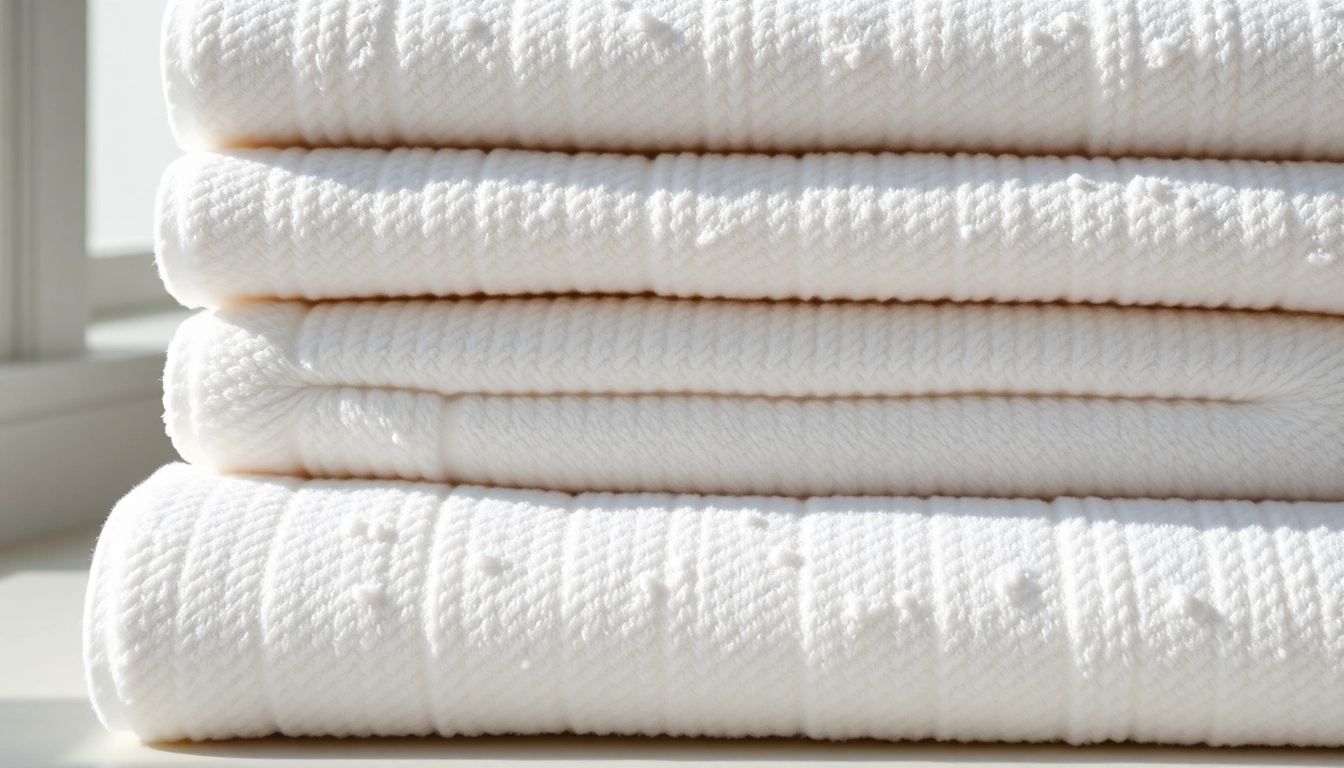Understanding Combed Terry Towels and Their Unique Benefits
In the highly competitive textile industry, the demand for premium-quality towels has surged, especially in hospitality, spa, and retail sectors. Among various towel types, Combed Terry towels supplier play a pivotal role in delivering superior softness, durability, and absorbency. These towels are crafted from specially processed cotton fibers, making them an excellent choice for consumers seeking luxury and long-lasting performance. This comprehensive guide explores the intricacies of combed terry towels, their advantages, sourcing strategies, manufacturing insights, and the latest market trends that define their prominent position in the global textile landscape.
What Are Combed Cotton Terry Towels?
Combed cotton terry towels are a premium variant of terry towels made from combed cotton fibers. The combing process involves brushing the raw cotton fibers to remove shorter hairs, lint, and impurities, resulting in longer, stronger, and smoother fibers. This process enhances the fabric’s quality, making it exceptionally soft, durable, and highly absorbent. The terry weave, characterized by looped piles on both sides, amplifies these features, providing a plush feel and excellent drying capabilities. These towels are often used in luxury hotels, spas, and high-end retail outlets due to their refined quality and appealing texture.
Advantages of Combed Cotton for Towel Manufacturing
- Enhanced Softness: Combed cotton fibers are longer and smoother, resulting in a softer towel surface, which is gentle on the skin.
- Superior Durability: The removal of short fibers reduces pilling and lint, extending the lifespan of the towel even after multiple washes.
- Increased Absorbency: The tightly woven, long fibers increase the towel’s ability to absorb moisture efficiently, making it ideal for frequent use.
- Reduced Lint and Dust: The combing process minimizes lint shedding, maintaining cleaner towels and reducing maintenance costs.
- Luxurious Appearance: The finer, smoother fibers give combed terry towels a premium look, enhancing brand image for manufacturers and retailers.
How Combed Terry Towels Differ from Regular Towels
While standard terry towels are made from regular cotton, combed terry towels undergo an additional refining step, setting them apart significantly. The main differences include:
- Fiber Quality: Combed cotton has longer, stronger fibers, whereas regular cotton contains shorter, coarser fibers.
- Texture and Feel: Combed towels are notably softer and smoother, providing a premium tactile experience.
- Durability and Longevity: The removal of weak fibers results in towels that resist pilling and maintain integrity over time, unlike regular towels that may degrade faster.
- Cost and Price Point: Due to their superior quality, combed terry towels typically command higher prices compared to regular terry towels.
Selecting a Trusted Combed Terry Towels Supplier
Choosing the right supplier is crucial for ensuring product quality, consistency, and timely delivery. Here are key factors to consider when selecting a Combed Terry towels supplier:
Key Factors to Consider When Choosing a Supplier
- Product Quality and Certifications: Ensure the supplier adheres to industry standards such as Oeko-Tex, ISO certifications, and eco-friendly manufacturing processes.
- Production Capacity and Lead Times: Assess their ability to fulfill your order volumes within your required timelines, especially during bulk or seasonal demand.
- Customization and Flexibility: Confirm if they offer customization options regarding towel size, color, logo printing, and fabric specifications.
- Reputation and Client References: Research their market reputation via client testimonials, case studies, and industry reviews.
- Pricing Transparency: Transparent pricing without hidden costs is essential for budget management and long-term partnerships.
Certifications and Quality Standards in the Industry
Leading suppliers often hold certifications such as OEKO-TEX Standard 100, ISO 9001, and environmentally sustainable manufacturing credentials. These certifications ensure the towels are free from harmful chemicals, meet international quality benchmarks, and are produced ethically. When evaluating potential suppliers, verify their certification documents to minimize risks associated with substandard products and non-compliance issues.
Evaluating Supplier Capabilities and Production Capacity
Advanced manufacturing facilities with modern machinery, skilled labor, and quality control departments are indicators of a reliable supplier. It’s vital to request detailed information on their production capabilities, turnaround times, and previous export experience, especially if you intend to source large quantities or require specific customization.
Manufacturing and Supply Chain Insights for Combed Terry Towels
Best Practices for Maintaining Quality During Production
Quality assurance begins at raw material selection. Trusted suppliers source high-grade combed cotton, often from recognized cotton-growing regions like Pakistan, India, or Egypt. During weaving, strict process control ensures the loop heights and fabric density are consistent, contributing to uniform plushness and absorbency. Post-production, spot checks, and laboratory testing verify dimensions, colorfastness, and durability.
Flexible MOQ and Customization Options
Many top-tier manufacturers offer flexible Minimum Order Quantities (MOQs), catering to startups and large companies alike. Customization options include various sizes, colors, embroidery, and logo printing, helping brands create a unique product identity that aligns with their market positioning.
Ensuring Timely Delivery and Reliable Logistics
Effective supply chain management is vital for maintaining product availability. Leading suppliers partner with reputable logistics providers, optimize inventory management, and maintain clear communication channels for real-time updates. Bulk shipping methods such as sea freight are common for international orders, ensuring cost-efficiency for large quantities.
Market Trends and Applications of Combed Terry Towels
Emerging Trends in Hotel, Spa, and Retail Sectors
The hospitality industry increasingly demands plush, eco-friendly, and aesthetically customizable towels. Organic cotton variants, sustainable production methods, and innovative designs—like color-blocking and embroidered branding—are gaining popularity. Additionally, there is a rising trend toward towels that combine luxury appeal with functional performance.
Popular Sizes, Colors, and Design Features
Standard towel sizes vary from hand towels (16×30 inches) to large bath towels (30×60 inches). Market demand favors neutral colors like white, beige, and gray, but vibrant hues and custom patterns are increasingly favored by boutique hotels and retail brands. Features such as double-stitched hems, embroidered logos, and textured borders add to the product’s premium look.
Pricing Strategies and Bulk Purchase Benefits
Economies of scale reduce unit costs significantly with larger orders, making bulk purchasing attractive for wholesale buyers. Suppliers often offer tiered pricing, discounts for long-term commitments, and value-added services like free samples or custom prototyping. Transparent pricing and favorable payment terms foster sustained partnerships.
How to Build a Long-Term Partnership with Your Towel Supplier
Effective Communication and Clear Specifications
Clear, detailed communication about product specifications, quality expectations, and delivery timelines is the foundation of a successful partnership. Providing comprehensive technical sheets, sample approvals, and regular updates minimizes misunderstandings.
Sample Testing and Quality Inspection Procedures
Before bulk orders, requesting samples for testing allows buyers to evaluate the material quality, absorbency, and stitching. Establishing pre-shipment inspections or third-party audits ensures conformity with agreed standards, reducing the risk of defective products reaching the market.
Creating Win-Win Agreements for Continuous Supply
Mutually beneficial contractual agreements, including favorable payment terms, volume-based discounts, and responsive customer service, foster loyalty and stability. Maintaining open communication channels helps address issues promptly, ensuring a seamless supply chain for long-term success.



